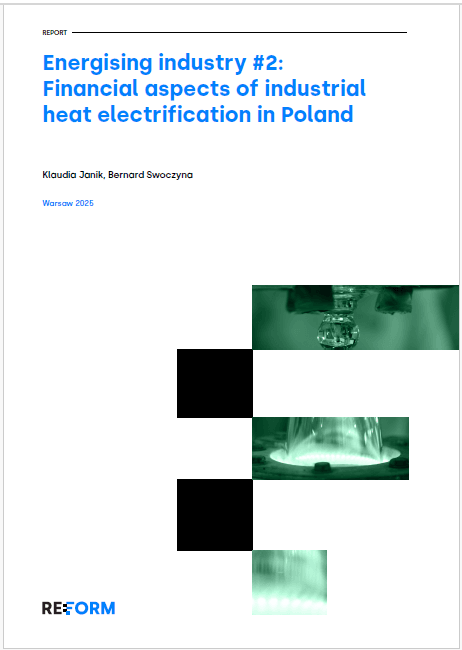“Energising industry #2. Financial aspects of industrial heat electrification in Poland” – a new report by the Reform Institute
About the project
Gas and biomass are only seemingly cheaper sources of heat for plants, as they will become a cost trap for industry in the coming years due to rising emission allowance prices and the development of RES. A recent report by the Reform Institute shows that the future belongs to electrification – industrial heat pumps will become more cost-effective than fossil fuels as early as next decade. However, the investment decisions need to be made now, as industrial transformation is a long-term process.
The second report in the “Energising Industry” series (first report available here) features an analysis of the financial barriers delaying the transformation of industrial heat sources, carried out by the experts from Reform Institute.
The main financial barrier is the high operating cost after the transition to electrification. Therefore, the authors underline that it is necessary to develop effective support instruments – especially for plants using heat up to 200°C, such as those in food processing and the paper industry.
“Adequate regulatory and financial incentives are needed to encourage modernization, on the one hand, and to stabilize operating costs after electrification, on the other. Without systemic solutions, electrification will remain a niche, and the industry will get stuck in technologies without a future” says Klaudia Janik, a Climate and Energy Policy Analyst at the Reform Institute and the co-author of the report.
The main reasons for the decline in the profitability of gas and biomass as heat sources are changes in the legal and economic environment, including the extension of the emissions trading system to smaller industrial plants, among others (ETS2 will come into force as early as 2027), and more favourable conditions for the development of renewable energy sources.
Two cost traps for the industry
Getting stuck in these technologies could pose a challenge for Polish plants:
The biomass trap – rising demand with a limited domestic supply of this resource will lead to price spikes. A possible tightening of the criteria for biomass classified as sustainable could make it a scarce and valuable resource. In contrast, biomass that fails to meet the criteria – such as wood chips – may be subject to emission fees.
The gas trap – installations using natural gas could become a burden for companies in just a few years, once the support mechanisms in place today (e.g., the co-generation bonus) end and additional emission fees appear.
Plants using heat up to 200°C in their production processes should already be deciding to change their power source. According to analyses, already in the coming years industrial heat pumps within hybrid systems will become cheaper to operate than gas boilers. Meanwhile, in the next decade, full electrification will be more cost-effective in any case.
“Although the next decade seems like a distant prospect, decisions need to be made today – investment processes in industry take up to 7-10 years, and rebuilding heat sources involves downtime and high costs” explains Senior Climate and Energy Policy Analyst at the Reform Institute and co-author of the report Bernard Swoczyna.
The ball is in the government's court
The report outlines precise steps the state can take to accelerate the transition and reduce the risk of costly delays. Among the recommendations are:
- modification of the capacity market fee for industry,
- promotion of dynamic tariffs and flexibility of energy consumption,
- investment (CAPEX) and operational (OPEX) support,
- elimination of subsidies for gas and inflexible customers,
- consideration of introduction of one-sided contract for difference for industrial heat.
Operational support – stabilizing costs after electrification – is particularly important. It has the greatest potential to break the current investment impasse. “It can not only encourage modernization but also prepare the industry for structural changes in the energy market” – states the report.
“Modernization of production facilities is a huge chance for lower bills, lower emissions and greater efficiency. However, we need investment decisions and real support for industry here and now – not ten years from now” stresses Aleksander Śniegocki, CEO of the Reform Institute.
Download documents
